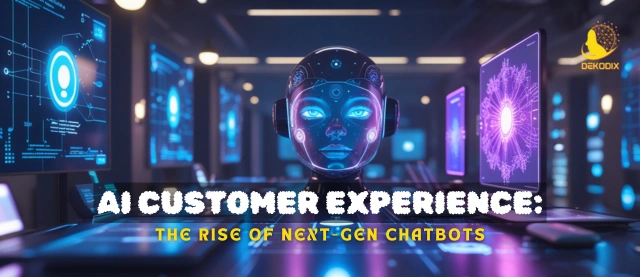Introduction: The Unseen Shift
Most people don’t understand that AI customer experience doesn’t replace people; it helps them.
AI will handle 90% of customer contacts by 2025. The magic isn’t in the code but in its efficiency. Imagine a world where your team doesn’t have to answer “Where’s my order?“ so often, and instead, you can work on problems that need to be solved, and your customers feel valued rather than controlled.
Chatbots will be very useful in 2025. Instead of being seen as robots, they could become invisible friends.
At Dekodix, we create tools for companies that dare to embrace change and stand up for what they believe in. Today, let’s talk about why change isn’t an option but an obligation.
The Chatbot That Learned to Listen
Chatbots will be here in 2025. What can we expect?
Early chatbots were like elevator music: boring, temporary, rude, and useless, making the user experience unpleasant and monotonous.
But the chatbots 2025 aren’t like other tech solutions: they’re the musicians of the future! These futuristic chatbots don’t follow scripts or play with your fingers. They can now detect a person’s frustration with sarcasm or anger and apologize if their words don’t make sense.
But Chatbots 2025? They’re the jazz soloists of tech. They don’t just follow scripts—they improvise. Thanks to breakthroughs in AI integration, they now understand sarcasm, detect frustration, and even apologize when they’re wrong.
How?
- They read between the lines. NLP stands for “natural language processing.”
- Emotional AI can detect if someone is typing in all caps (we’ve all done it).
- You don’t need to memorize comments from the past few months because contextual memory does that for you.
At Dekodix, we build chatbots that ask, “How can I help you?” instead of asking users to “choose an option from a menu”.
3 Trends That Separate the Curious from the Committed
1. The Death of “One-Size-Fits-All”
Responding commonly is rude to your customers. Bots that know what users have purchased, their time zone, and even their cat’s name (if they’ve ever said it). This is called “AI Customer Experience for 2025.”
2. Bots That Predict Tomorrow’s Problem Today
With Chat automation, it’s not about speed. It’s about preparation. Please take a look at a bot that emails customers with shipping updates before they request them.
3. Ethics as a Feature, Not a Footnote
GDPR isn’t just a box to check. You have to do it. By 2025, AI customer experience service tools will proudly display the boundaries of privacy.
Why This Isn’t About Cost-Cutting (It’s About Trust)
Businesses often opt for chat automation because it saves them money. However, customers don’t care much about profit margins; what matters to them is whether they feel valued by the brand.
Here’s the paradox:
- By using AI integration, client Dekodix was able to reduce their service costs by 40%.
- Their customer satisfaction rate increased by 60%. Why?
For one simple reason: when automated systems perform boring tasks, real people can do what they do best: connect with others in a real way.
How to Start Small and Win Big
- Find Your “Grunt Work”
What tasks exhaust your team members? Password resets, order tracking, and meeting scheduling are usually their top priorities. - Choose a Partner, Not a Product
While generic bots can answer simple questions, to build trust, you need AI integration designed to meet your business needs. For example, Dekodix has created bots that are exactly what you need. - Teach It Like a New Hire
Make sure your bot connects with other people before using it. The more information you get, the fewer mistakes you’ll make when using it. - Celebrate the Handoffs
When a bot tells you it can “connect you to Maria”, don’t see it as a failure but as a success.
The ROI of Saying “I Don’t Know”
A Midwestern retailer took an unusual approach: it taught its Dekodix robot to say, “I don’t know, let me connect you with someone who does.”
Results?
- A 50% decrease in events that escalated (being honest seems to calm anger).
- An 18% increase in 5-star reviews mentioning “refreshing honesty.”
The key point? When it comes to customer service, AI works best when it’s open and doesn’t strive for perfection.
The Next Chapter (Spoiler: It’s Human)
- Bots as Storytellers: Imagine having an intelligent travel assistant who helps you book accommodations and tells you stories about the area. This could be a service offered by digital storytellers to enhance the experience.
- Silent Observers: AI that observes how people act might remark, “You’ve been distant lately; is everything okay?“
- The Empathy Metric: Companies will strive to demonstrate a high level of care in every interaction on the compassion scale, with the most effective bots ranking at the top.
How to Pick Tools That Don’t Rust
Ask 3 questions:
- “Can it grow with us?” (Be wary of legacy tools.)
- Is it compatible with other platforms? (Apps like Slack, Salesforce, or Shopify can make a strong impression.)
- Are you on board? (Dekodix provides ongoing support after launch to ensure your bot is integrated with your team an AI customer experience.)
Conclusion: The Quiet Part Out Loud
By Chatbots 2025, won’t replace your team; they’ll discover what you do best.
When machines do the most boring tasks, kindness and connection matter.
Final Call To Action
Are you ready to create a chatbot that shows you who you really are? At Dekodix, our goal isn’t just to build software. We want to create tools that help people have deeper conversations and an amazing AI customer experience. Contact Dekodix today, and let’s do something great together, for more follow us on Facebook.
FAQs (The Questions You’re Too Busy to Ask)
Will AI customer experience make us inaccessible?
Only if you let it. Bots can help you defend your beliefs; choose tools that say, “We really care about you.”
What if we run into problems integrating AI?
That’s what we want to do! Dekodix creates bots that evolve with you, not just for you.
Can chat automation be beneficial for small teams?
Of course. It’s not the size of the team that makes it successful; rather, it is spending time on what really matters.




